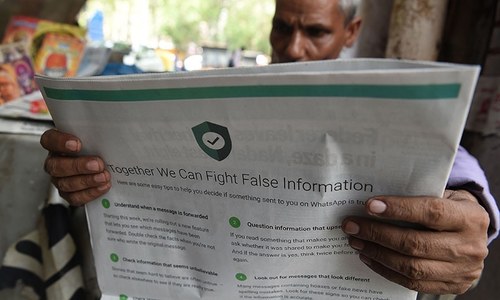Social media giant Facebook Inc said on Friday it would strengthen measures to fight fake news in Australia and briefly block foreigners from buying political advertisements in the lead-up to a national election due in a few weeks.
The move comes with the company — and its peers around the world — under growing pressure to rid their platforms of misinformation after Russia allegedly used Facebook to influence the 2016 United States presidential election.
Take a look: Google, Facebook, Twitter must do more against fake news: EU
In Australia, it is not clear which, if any, foreigners had sought to buy campaign ads, but the government warned in 2017 of Chinese interference attempts and said in February a foreign government had hacked parliament's computer network.
The Facebook's move also comes as its market power and social influence faces greater scrutiny, particularly in the wake of the mass shooting at a mosque in New Zealand which was broadcast live on one of the US firm's platforms.
Facebook said its new controls on Australian political advertising would take effect as soon as the vote was called, which is expected to happen in the next few days.
Foreigners would be forbidden from buying advertising mentioning political parties, slogans and logos, Mia Garlick, Facebook's director of policy for Australia and New Zealand, said in a statement.
To fight so-called fake news and misinformation, the US firm would launch a fact-checking service in Australia in partnership with French news agency Agence France-Presse, she added.
It would also remove fake accounts and make sensational stories less prominent in users' newsfeeds. Australia's major political parties, which between them are expected to spend millions of dollars buying Facebook ads during the campaign, had no comment on the company's announcement on Friday.
Global problem
Policing social media content has become a massive global problem, with no template for consistently preventing fake news online or eliminating it.
Andrea Carson, a political scientist specialising in media and communications at La Trobe University in Melbourne, said Facebook faced tighter regulation in the future.
“There's a climate for change,” she said.
Fierce internet disinformation battles have gripped countries such as Brazil and Malaysia ahead of elections.
Authorities in Indonesia and the European Union, which are due to hold polls, have also warned of the threat of fake news, while in India, Facebook has ramped up efforts to block fake accounts.
The market dominance of Facebook and of Alphabet Inc's Google has also drawn the attention of Australia's competition regulator, which is pushing for greater scrutiny of their power and influence, something the firms are resisting.














































